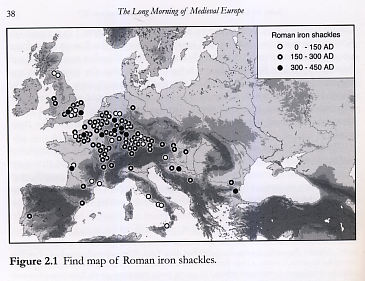Slavery, Vikings, and Charlemagne
1. At the library, I recently picked up The Long Morning of Medieval Europe: New Directions in Early Medieval Studies
I wanted to look for some material on agriculture—the adoption of the three-field system, wheeled plows, etc.—but I was sucked into a chapter entitled, "Strong Rulers—Weak Economy? Rome, the Carolingians and the Archaeology of Slavery in the First Millennium AD" by a German scholar, Joachim Henning.
Here are two figures that I have lifted from his work:
As I used to tell my students when we talked about American religion and slavery, the Roman empire back in Jesus' time ran on slavery the way that our civilization runs on petroleum. (And Jesus had nothing to say about it.)
Slavery requires chains and shackles, lest the slaves wander away. Figure 2.1 is a map of archaeological sites (farms, villas, plantations) containing shackles.

The second figure graphs shackle finds over time in Gaul (France, roughly). They rise during the Roman times, then plunge during the Merovingian dynasty, during the so-called Dark Ages.
But then shackle finds—and hence presumably slavery—rise during the Carologian dynasty. Its founder, Charles Martel (ca. 688-741), stopped the Islamic expansion into Europe. His grandson Charlemagne (Charles the Great) is a huge figure in medieval western European history, but his actions included the slaughter of more than 4,000 Saxons who resisted conversion to Christianity.
There was a European slave trade in Pagan, polytheistic Roman times—and it continued into Christian times, up through the 1400s, at least—and then it was time for Columbus!
2. Meanwhile, a British historian suggests that Viking raids on Europe might have been payback for Charlemagne's forced-conversion program. (Via the Covenant of the Goddess NPIO blog.)
But before you annoint the Vikings as the pro-Pagan "good guys," remember that they were in the slave trade too, particularly in what is now Ireland and Russia.
As some people say about their relationships on Facebook, "It's complicated."




